- Joined
- Oct 9, 2007
- Messages
- 47,638 (7.44/day)
- Location
- Dublin, Ireland
| System Name | RBMK-1000 |
|---|---|
| Processor | AMD Ryzen 7 5700G |
| Motherboard | Gigabyte B550 AORUS Elite V2 |
| Cooling | DeepCool Gammax L240 V2 |
| Memory | 2x 16GB DDR4-3200 |
| Video Card(s) | Galax RTX 4070 Ti EX |
| Storage | Samsung 990 1TB |
| Display(s) | BenQ 1440p 60 Hz 27-inch |
| Case | Corsair Carbide 100R |
| Audio Device(s) | ASUS SupremeFX S1220A |
| Power Supply | Cooler Master MWE Gold 650W |
| Mouse | ASUS ROG Strix Impact |
| Keyboard | Gamdias Hermes E2 |
| Software | Windows 11 Pro |
Transcend brought its latest flash storage and PC memory products to Computex 2023. The company, much like Kingston and Micron, appears to be focusing on the high-volume mid-range of the market that it can sell both in the retail channel and to OEMs, without too much invested on niche high-end ones. To begin with, the company showed us its DDR5 UDIMMs and RDIMMs. Nothing flashy—these stick with JEDEC-standard speeds, such as DDR5-5600 (13th Gen native speed), and DDR5-4800.
The company doesn't have PCIe Gen 5 SSDs yet, but we were shown a handful Gen 4 ones meant for the DIY retail channel, including the PCIe SSD 250H (MTE250H), with its sporty heatsink, and extensive testing for PlayStation 5 compatibility; and its alter-ego without the heatsink, the PCIe SSD 250S (MTE250S). These drives come in capacities ranging between 1 TB to 4 TB, with sequential transfer speeds of up to 7.5 GB/s reads, and up to 6.7 GB/s writes. Also shown were a set of smaller NVMe Gen 3 SSDs in the M.2-2230 and M.2-2260 form-factors, the MTE300S and MTE400S, respectively. With capacities of just 256 GB and 512 GB for the MTE300S, and 256 GB thru 1 TB for the MTE400S, these drives are probably meant for hand-held game consoles, or low-cost desktop PCs, where OEMs or SIs buy them in large quantities.
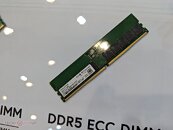
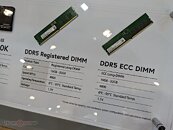
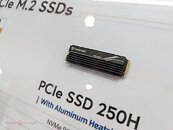
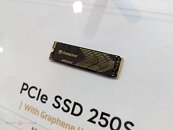
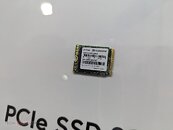
Among the portable SSDs shown were the ESD380C, with its USB 3.2 Gen 2x2, with its 500 GB thru 4 TB capacity options, and sequential transfer speeds of 2 GB/s in either direction. The compact drive weighs just 75 g. The ESD310C is, from the looks of it, a USB flash drive with type-A and type-C connectors on its either ends, weighing just 11 g; but Transcend is choosing to call it the "smallest SSD." It comes in capacities of 256 GB thru 1 TB, and offers sequential speeds of up to 1050 MB/s reads, with up to 950 MB/s writes. The drive uses USB 3.1 Gen 2 (10 Gbps) interface. The ESD260C is a slightly larger, white+silver portable SSD that is barely the size of a car key fob. It uses a 10 Gbps USB 3.1 Gen 2 interface (type-C or type-A using cables), with sequential transfer rates of 520 MB/s reads with up to 460 MB/s writes. The drive comes in capacities ranging between 250 GB to 1 TB.

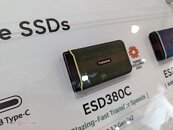
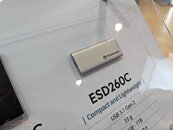
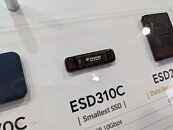
Transcend is also making its foray into the surveillance market, with the DrivePro line of dashboard cameras. The company showed off a range of DrivePro series cameras of different form-factors (meant for motorcycles, cars, taxis/Ubers, and large transport vehicles. Most of these offer 1440p QHD resolution, except for the DrivePro 20 with its 1080p, and they all meet IP68 dust and water resistance. Besides vehicle dash-cams, Transcend also showed us the DrivePro Body line of wearable cameras. Transcend isn't exactly trying to eat GoPro's lunch here, but perhaps Axon's. These cameras are meant for the Law-Enforcement, Emergency Response, and construction markets.

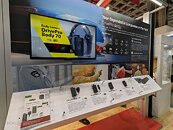
View at TechPowerUp Main Site
The company doesn't have PCIe Gen 5 SSDs yet, but we were shown a handful Gen 4 ones meant for the DIY retail channel, including the PCIe SSD 250H (MTE250H), with its sporty heatsink, and extensive testing for PlayStation 5 compatibility; and its alter-ego without the heatsink, the PCIe SSD 250S (MTE250S). These drives come in capacities ranging between 1 TB to 4 TB, with sequential transfer speeds of up to 7.5 GB/s reads, and up to 6.7 GB/s writes. Also shown were a set of smaller NVMe Gen 3 SSDs in the M.2-2230 and M.2-2260 form-factors, the MTE300S and MTE400S, respectively. With capacities of just 256 GB and 512 GB for the MTE300S, and 256 GB thru 1 TB for the MTE400S, these drives are probably meant for hand-held game consoles, or low-cost desktop PCs, where OEMs or SIs buy them in large quantities.





Among the portable SSDs shown were the ESD380C, with its USB 3.2 Gen 2x2, with its 500 GB thru 4 TB capacity options, and sequential transfer speeds of 2 GB/s in either direction. The compact drive weighs just 75 g. The ESD310C is, from the looks of it, a USB flash drive with type-A and type-C connectors on its either ends, weighing just 11 g; but Transcend is choosing to call it the "smallest SSD." It comes in capacities of 256 GB thru 1 TB, and offers sequential speeds of up to 1050 MB/s reads, with up to 950 MB/s writes. The drive uses USB 3.1 Gen 2 (10 Gbps) interface. The ESD260C is a slightly larger, white+silver portable SSD that is barely the size of a car key fob. It uses a 10 Gbps USB 3.1 Gen 2 interface (type-C or type-A using cables), with sequential transfer rates of 520 MB/s reads with up to 460 MB/s writes. The drive comes in capacities ranging between 250 GB to 1 TB.




Transcend is also making its foray into the surveillance market, with the DrivePro line of dashboard cameras. The company showed off a range of DrivePro series cameras of different form-factors (meant for motorcycles, cars, taxis/Ubers, and large transport vehicles. Most of these offer 1440p QHD resolution, except for the DrivePro 20 with its 1080p, and they all meet IP68 dust and water resistance. Besides vehicle dash-cams, Transcend also showed us the DrivePro Body line of wearable cameras. Transcend isn't exactly trying to eat GoPro's lunch here, but perhaps Axon's. These cameras are meant for the Law-Enforcement, Emergency Response, and construction markets.


View at TechPowerUp Main Site

